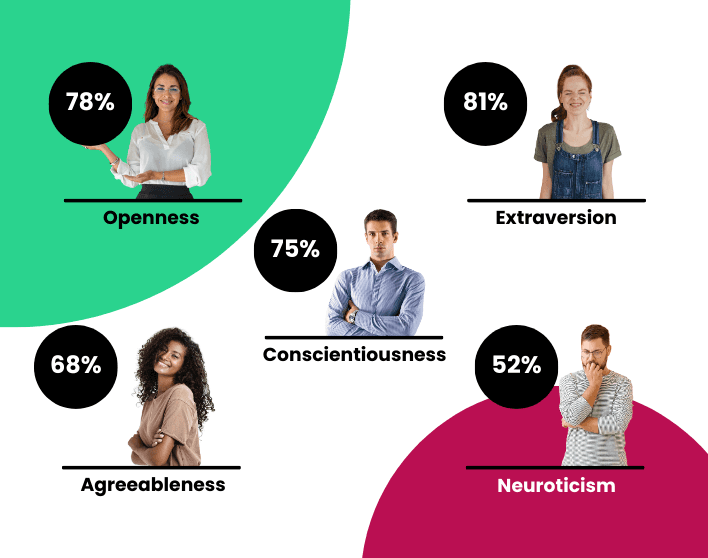Markellos Diorinos
CEO, Bryq
If you’re looking to streamline your recruitment processes and make better hiring decisions, pre-employment testing can help with this. Discover insights into your candidates and how well-suited they are to the position available by asking them to take a pre-employment assessment. One test that many recruiters are now using is the 16PF (Sixteen Personality Factor Questionnaire). Find out more about how it works and the pros and cons of incorporating it into your next recruitment process.
What Is A 16PF?
The 16PF (Sixteen Personality Factor Questionnaire) provides a way to assess an individual’s personality using a structured approach. Developed by Dr Raymond Cattel, this tool was first published in 1949.
Today, the 16PF (Sixteen Personality Factor Questionnaire) is a self-assessment report that uses the five-factor model of personality. This psychometric tool is designed to measure the respondents against sixteen factors that, when combined, make up your personality.
This assessment is used to predict behavior in the workplace, as well as performance and communication. Hiring managers enjoy using this tool during the recruitment process to determine how an applicant may interact with others and whether that person may fit well with the other personalities in the team.
The sixteen traits of the 16PF (Sixteen Personality Factor Questionnaire) can be divided into five umbrella categories as follows:
Extraversion: Relating to others. Does the person spend more time focusing on their relationships in the workplace or completing tasks?
Independence: Influence and collaboration. Does the candidate have an assertive style, or are they more cooperative?
Toughmindedness: Thinking style. Is the candidate realistic and objective, or are they more intuitive and creative?
Self-control: Structure and flexibility. Does this person have a flexible approach, or are they more disciplined in handling things?
Anxiety: Management of pressure. How does this person cope when they experience setbacks or challenges, and how do they handle stress?

Advantages of a 16PF In Hiring
Objectivity
As a recruiter or hiring manager, it can be difficult to justify why you chose the person you hired for a position. By implementing a personality assessment such as the 16PF (Sixteen Personality Factor Questionnaire), you will have data to base your decisions on, making them easily justifiable. Gain objective insight into your candidates’ personalities and make your hiring decision more straightforward.
Increased Self-Awareness
By answering questions about their own personality, many respondents find that they gain more insight into how they behave in the workplace. Reading the results can increase the candidate's self-awareness, as they can easily see their strengths and areas in which they may like to develop their skills.
Easily Narrow Down Your Candidate Pool
If you’re struggling to reduce your shortlist to a realistic number of people to interview, the 16PF (Sixteen Personality Factor Questionnaire) can help. After having applicants complete this assessment, you will know more about each individual, and that can help you decide who to bring in to interview.
Informed Interview Process
Having additional information about your candidates when coming into the interview is useful, as you already know quite a lot about these people before you ask them anything. If you have any concerns following the personality test results, you can steer your questions to find out more about these potential problem areas. It also provides a way to talk to candidates about their strengths and weaknesses from the test results.
Support Desired Workplace Culture
You likely have a desired workplace culture your organization aims to achieve. To support culture change, your hiring process must align with the strategy. That means hiring the right kinds of people who will change up your organization for the better. For example, if you want people to speak their minds more, you can use a personality assessment to hire someone who is direct and honest.
Hire for Team Fit
Another advantage of using the 16PF (Sixteen Personality Factor Questionnaire) during recruitment is that you can locate a candidate who will be an ideal fit within the team they will join. Teams work best when there are a variety of personalities in them, as this fosters creativity, problem-solving, and cooperation. If everyone was the same, it would be harder for the group to develop new ideas. Find a person who complements the existing personalities within the team.
Disadvantages of 16PF in Hiring
Less Predictive of Job Performance When Used Alone
Many hiring managers include a personality assessment in the recruitment process, expecting it to predict how well someone will perform. However, that’s not the main goal of a personality test. They can tell you a lot about how someone works, which can assist you in finding the best ways to manage that person and decide whether they are likely to fit into the team. However, they are not hugely indicative of job performance when used alone. To most accurately predict job performance, hiring managers would need to use an assessment that includes both personality traits and cognitive ability questions.
Reliability of Answers
Many job candidates will answer personality tests intentionally or unconsciously by selecting the responses they think the hiring manager would prefer. This can make the results of the 16PF (Sixteen Personality Factor Questionnaire) largely invalid or hard to interpret in any meaningful fashion.
Personality Tests are Beneficial in the Hiring Process
By asking job candidates to undertake a personality assessment such as the 16PF (Sixteen Personality Factor Questionnaire), you can gain much more detail on how this person behaves. This will assist you in making better, more informed hiring decisions. You can select someone who will fit in with their team and the workplace culture, narrow your candidate pool, and have a more informed interview process. Make your hiring decisions more objective by incorporating one of these tests next time you hire a new staff member. You will likely find that this makes the process far easier for you.








